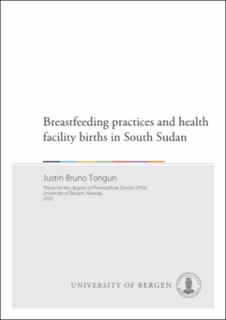| dc.contributor.author | Tongun, Justin Bruno | en_US |
| dc.date.accessioned | 2020-02-11T13:22:13Z | |
| dc.date.available | 2020-02-11T13:22:13Z | |
| dc.date.issued | 2020-01-09 | |
| dc.date.submitted | 2019-12-17T09:35:29.816Z | |
| dc.identifier | container/a7/92/3d/b7/a7923db7-5c3c-45c4-91d5-db0edef1ac61 | |
| dc.identifier.isbn | 9788230851838 | en_US |
| dc.identifier.isbn | 9788230840795 | en_US |
| dc.identifier.uri | https://hdl.handle.net/1956/21390 | |
| dc.description.abstract | Introduction: Studies on the determinants of breastfeeding practices and health facility utilization have not been conducted in South Sudan. This thesis assessed the prevalence and determinants of suboptimal breastfeeding practices especially delayed initiation of breastfeeding and pre-lacteal feeding. We also assessed the effect of the Baby-Friendly Hospital Initiative training on breastfeeding practices. Methods: The work in thesis consist of three surveys. The first was a cross-sectional study among 806 mothers in Juba Teaching Hospital in South Sudan. This assessed the prevalence and factors associated with delayed initiation of breastfeeding using bivariable and multivariable logistic regression analysis. The second survey among 806 mothers in the same hospital – together with the first survey – became a “before and after study” assessing the effect of the Baby-Friendly Hospital Initiative training on early initiation of breastfeeding using a modified Poisson model. In the third survey, we interviewed 810 mothers in a rural community in Jubek State in South Sudan. We assessed the prevalence and determinants of pre-lacteal feeding and the level and determinants of health facility utilization at birth. Results: In the first survey in the hospital, the prevalence of delayed initiation of breastfeeding was 52% and factors associated with delayed initiation of breastfeeding included caesarean section, discarding of colostrum, single mother, exposure to advertisement of infant formula and lack of house ownership. In the second survey in the hospital after the Baby-Friendly Hospital Initiative training, we found a high prevalence of early initiation of breastfeeding 91% compared to 48% before the training. Regardless of the mode of birth, the training intervention was effective in increasing early initiation of breastfeeding In third survey in the community, the prevalence of pre-lacteal feeding was 53 % and proportion of mothers giving birth at a health facility was 25.8%. The predictors of health facility birth included antenatal visits, mother’s education, socio-economic status, and first-time mothers. Conclusion: The findings in this thesis highlight the need for efforts to increase health facility births, breastfeeding counselling, promote the health benefits of early initiation of breastfeeding, and colostrum, roll out the Baby-Friendly Hospital Initiative training to other hospitals in the country and discourage discarding of colostrum and the use of pre-lacteal feeds. | en_US |
| dc.language.iso | eng | eng |
| dc.publisher | The University of Bergen | eng |
| dc.relation.haspart | Paper I: Justin Bruno Tongun, Mohammed Boy Sebit, David Mukunya, Grace Ndeezi, Victoria Nankabirwa, Thorkild Tylleskar and James K. Tumwine. Factors associated with delayed initiation of breastfeeding: a cross-sectional study in South Sudan. International Breastfeeding Journal 2018 13:28. The article is available in the main thesis. The article is also available at: <a href="https://doi.org/10.1186/s13006-018-0170-0" target="blank">https://doi.org/10.1186/s13006-018-0170-0</a>. | en_US |
| dc.relation.haspart | Paper II: Justin Bruno Tongun, James K. Tumwine, Grace Ndeezi, Mohammed Boy Sebit, David Mukunya, Jolly Nankunda, and Thorkild Tylleskar. The effect of health worker training on early initiation of breastfeeding among mothers in South Sudan: a before and after hospital-based study. Int. J. Environ. Res. Public Health 2019, 16(20), 3917. The article is available in the main thesis. The article is also available at: <a href="https://doi.org/10.3390/ijerph16203917" target="blank">https://doi.org/10.3390/ijerph16203917</a>. | en_US |
| dc.relation.haspart | Paper III: Justin Bruno Tongun, Mohamedi Boy Sebit, Grace Ndeezi, David Mukunya, Thorkild Tylleskar and James K. Tumwine. Prevalence and determinants of prelacteal feeding in South Sudan: a community-based survey. Global Health Action 2018, VOL. 11, 1523304. The article is available in the main thesis. The article is also available at: <a href="https://doi.org/10.1080/16549716.2018.1523304" target="blank">https://doi.org/10.1080/16549716.2018.1523304</a>. | en_US |
| dc.relation.haspart | Paper IV: Justin Bruno Tongun, David Mukunya, Thorkild Tylleskar, Mohamedi Boy Sebit, James K Tumwine, Grace Ndeezi. Determinants of health facility utilization at birth in South Sudan. Int. J. Environ. Res. Public Health 2019, 16(13), 2445. The article is available in the main thesis. The article is also available at: <a href="https://doi.org/10.3390/ijerph16132445" target="blank">https://doi.org/10.3390/ijerph16132445</a>. | en_US |
| dc.rights | Attribution-NoDerivs (CC BY-ND) | eng |
| dc.rights.uri | https://creativecommons.org/licenses/by-nd/4.0/ | eng |
| dc.title | Breastfeeding practices and health facility births in South Sudan | en_US |
| dc.type | Doctoral thesis | |
| dc.date.updated | 2019-12-17T09:35:29.816Z | |
| dc.rights.holder | Copyright the Author. | |
| dc.contributor.orcid | http://orcid.org/0000-0001-8884-2859 | |
| fs.unitcode | 13-26-0 | |

